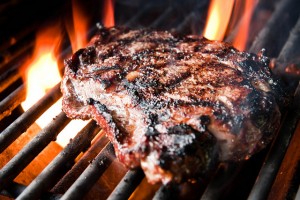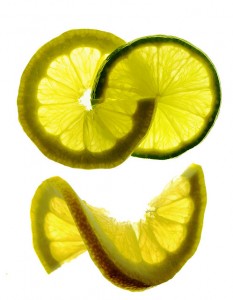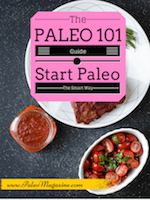Is Grilling Paleo? 5 Easy Tips to Make Your Grilling Healthier

You think all the time about WHAT you eat, but do you think about HOW you cook it?
The ways that you cook (or don’t cook) food can make a difference in how healthy that food is for you, so it’s worth thinking about.
Today, I’m going to introduce you to the main concerns with respect to grilling, why those concerns may or may not be justified, and what you can do to minimize any risks.
Isn’t Grilling Very Paleo?
Surely grilling must be the most Paleo of cooking methods, right?
After all, haven’t humans had control of fire for somewhere between 125,000 and 400,000 years? (Yes) And doesn’t both archeological evidence and observation of recent hunter-gatherer civilizations confirm that humans have been using fire to cook with for quite a while? (Yes)
So there you have it. Humans have been cooking food in a “grilling” manner for a very long time.
But remember. Paleo is about more than just whether humans have done something or eaten something for a very long time. It’s about whether it’s the healthiest and best way to do things. And to answer that question, we’ve gotta look a little more in depth at the issue of grilling.
Here’s a quick video I put together that covers some of the points below:
What are the Main Risks of Grilling
In one word, Carcinogens.
(There are other considerations, such as nutrient bioavailability, but those considerations are very small when taken in perspective, and such considerations may even be in favor of grilling.)
In particular, the concern is that grilling meat might lead to the production and ingestion of carcinogens, and might, therefore, increase the likelihood of cancer. Here’s why that might be the case:
- Formation of HCAs and PAHs. Unless you’re really into this, you probably don’t know what Heterocyclic Amines (HCAs) and Polycyclic Aromatic Hydrocarbons (PAHs) are. HCAs and PAHs are 2 compounds that are formed when meat is grilled, especially when the meat is charred, comes into contact with the flame, or comes into contact with the smoke.
- Increased Risk of Cancer. Certain studies in lab animals have shown that giving high levels of HCAs and PAHs to those animals results in a higher risk of cancer. These are all animal studies, but it’s not unreasonable to think that there is some correlation with humans.
In other words, when you grill meat, there is good evidence that you’re forming and then eating compounds that might increase your risk of cancer. The question then is this…
How Worried Should You Be About Grilling

It’s impossible (and just silly) to try avoiding every single risk. After all, there’s a small risk that breathing might cause you to inhale minor toxins no matter where you live. But you’re not going to stop breathing.
Here are my thoughts on the risks associated with grilling from a Paleo perspective:
- Hazard Levels Unknown. What I mean by this is that we don’t really know how many HCAs or PAHs a human would need to eat in order to increase their risk of cancer. The studies with lab animals (a) are on lab animals and (b) use pretty high doses of HCAs and PAHs. This doesn’t mean that there’s no risk – just that we don’t know how big the risk is.
- PAHs are in Lots of Foods. Both vegetables and grains contain a lot of PAHs, so grilled meats are not the only place you’re getting this compound. With any carcinogen, the less you get of it, the better, but the fact that you’re going to get it from vegetables you eat makes me a little less worried about getting a little more from grilled meat.
- History. I wouldn’t rely solely on this reason, but humans have been cooking over fire for a very long time, and there are studies of many tribes who have almost no incidence of cancer. There could be a variety of reasons why they don’t have cancer, but it at least means that eating grilled meat will not inevitably lead to cancer.
I do think that grilling is likely not the healthiest way of cooking, largely because of the added carcinogens, but that doesn’t mean that I’m going to give it up completely. What I do suggest is taking these precautions:
5 Tips to Make Grilling Healthier
- Don’t Do it Every Day. The dose makes the poison. If grilling is, in fact, somewhat carcinogenic, then doing it a few times a year probably isn’t much of a concern. Doing it all the time, though, is a bigger risk.
- Keep Meat Away from the Flame. Most of the HCAs and PAHs are formed through contact with flame or smoke. If you cook on cedar, metal, aluminum foil, or something like these Grill Grates, then your meat will come into less contact with the flame and smoke and therefore produce fewer carcinogens.

- Marinate! You should be doing this just for the flavor and tenderness. However, one study showed that marinating meat for just an hour in a acid-based marinade (like lemon juice or vinegar) can reduce the formation of advanced glycation end-products up to 90%. (Advanced Glycation End-Products are another toxin formed when grilling.)
- Don’t Overcook. Your steak connoisseur friends are going to make fun of you if you over-cook your steaks. Plus, over-cooking exposes your meat to higher temperatures for longer and hence increases the amount of carcinogens produced.
- Thaw Your Meat Well. Put it in the microwave if necessary. This will allow you to cook the meat over open fire for a shorter period of time.
Should You Stop Grilling?
Of course not!
Grilling is a largely social activity that is fun and produces delicious food. From an evolutionary perspective, people have been doing it for hundreds of thousands of years.
But still, you can take a few, easy precautions (like those I listed above) and make it even healthier and more Paleo.
Let me know what you think! How often do you grill? Do you have any tips for making it healthier (or more delicious)? Leave a comment below!
Images (in order): Robert S. Donovan, Another Pint Please…, and PhotoGraham.

